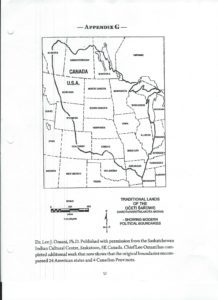As we gather with family and friends over this holiday week it’s important for us to acknowledge the actual history of what we are celebrating, namely the colonization of this land by white settlers and the real harm and violence that has been done to the land and to the Indigenous peoples from whom it was taken and who have been fighting to protect it ever since, including the Očhéthi Šakówiŋ right here in South Dakota. This is our history, and we must acknowledge it.
We do not bring it up to engender a sense of guilt or to spoil much needed time with our loved ones, but instead to be mindful of our shared community and our shared history. To be humble and grateful in our reliance on one another, so that we might do better by each other and the land we all share.
This week, Dakota Rural Action will be posting a series of resources on the history of this holiday, Thanksgiving, and the false narratives associated with it. We invite you to explore and share and discuss.
To start we off, we offer a Land Acknowledgement, drafted by DRA members and staff, which will be published in our upcoming SoDak Grower’s Guidebook.
Dakota Rural Action (DRA) was founded on the homelands of the Očhéthi Šakówiŋ, the Seven Council Fires, The Great Sioux Nation; land that was stolen, which DRA is organizing and working on today. DRA acknowledges and offers respect to the generations of Indigenous people who both stewarded this land for thousands of years and are continuing to care for the earth through fostering traditional foodways, risking their lives to fight extractive oil pipelines, and so much more. DRA is committed to learning more about this land and its people and to do the work to be a good ally & co-conspirator. When given the opportunity DRA and its members will show up, sit down, listen, and take action when appropriate.
Dakota Rural Action is working to build resilient communities by re-skilling individuals around sustainable practices and agriculture. At the same time, DRA acknowledges that the sustainable agriculture movement has centered white voices, contributions, and expertise all the while appropriating methods long practiced by Black, Indigenous, migrant, and People of Color cultures. Furthermore, we are part of a larger food system that is violently out of balance and entrenched in patterns of injustice. Because of this, at DRA we try to go beyond acknowledging this historical and ongoing violence of land theft and slavery, by doing the slow work of unpacking this and also taking action to restore, repair, and work towards reparations as an organization and as individual members. We have a long way to go as an organization to realize these values. We believe that participation and leadership from sustainable agriculture pioneers as well as newer practitioners – diverse farmers, ranchers, and farm workers – is vital to building the power of this movement and increasing resiliency in our communities.
MORE INFORMATION @ https://native-land.ca/maps/territories/oceti-sakowin-sioux/

